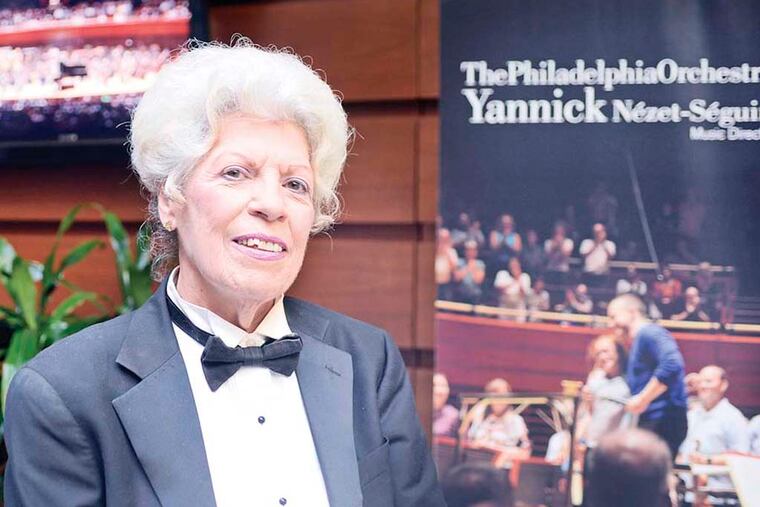Q&A with Antoinette Marie DuBiel
It's the rare concertgoing eye that hasn't at some point fastened onto the reliable sight of a low, silvery bouffant making its way up and down the aisles of the Academy of Music or Verizon Hall. Antoinette Marie DuBiel took up her spot in the Academy two

It's the rare concertgoing eye that hasn't at some point fastened onto the reliable sight of a low, silvery bouffant making its way up and down the aisles of the Academy of Music or Verizon Hall. Antoinette Marie DuBiel took up her spot in the Academy two decades ago and ushers four or five events a week during the season. Raised in Chestnut Hill, she was once a budding pianist with a degree in performance from Chestnut Hill College. After a career in real estate, she is now assistant head usher and hears more concerts than most critics.
Q: How did you become an usher?
A: I guess I wasn't looking for a job, and the opportunity presented itself. My husband was there, my daughter was there [both as ushers], and I took the baton and ran with it. I love music, and I was always there anyway, so I said I would try it. Now I'm an antique.
Q: What are the most memorable concerts and shows in your experience?
A: I'm an opera lover - I even love when the orchestra does overtures. I am a big fan of Verdi, a big fan of Puccini. I love the Masses and the requiems. What I love is what I am listening to at the moment. I have that need to hear good music.
Q: Have audiences changed in your time?
A: Yes. Believe it or not, in 20 years, I remember when you couldn't get an orchestra seat Friday afternoon without a subscription. To hear the orchestra Friday afternoon was an honor. They came to the concerts as if they were going somewhere. They dressed up, and acted the same way. They had concert etiquette. Never would you bring a bottle of water to a concert.
Now, it has totally changed. Maybe the total dress-up and the white gloves were a bit much, but what we have now is the other extreme. But I do like the idea of students attending, because I think it's important for them to learn good music. That part I do like to see. It makes me feel there is hope.
Q: What is the audience-behavior infraction you find yourself dealing with most often - are cellphones a problem?
A: I am surprised they are not a bigger problem. Cellphones today are an appendage. So far, we haven't had them talking on the phone while a concert is going on.
Q: Are audiences different hall to hall, night to night?
A: I do think the Chamber Orchestra [of Philadelphia] and Philadelphia Chamber Music Society have devoted audiences - they really come to hear the music, they understand it, they appreciate it, and they don't want to hear anyone talking. Somehow, that mood permeates the theater. And it's nice.
CONDUCTORS SHE LOVES
Riccardo Muti. He had charisma, and all the drama that goes with making music.
Wolfgang Sawallisch. He was
a consummate musician, a kind person, very private.
Yannick Nézet-Séguin. He's full of personality. I think that's part of what's important.
Charles Dutoit came in and saved the orchestra at just the right time.
And, of course, Simon Rattle. He can rattle you, all right.EndText